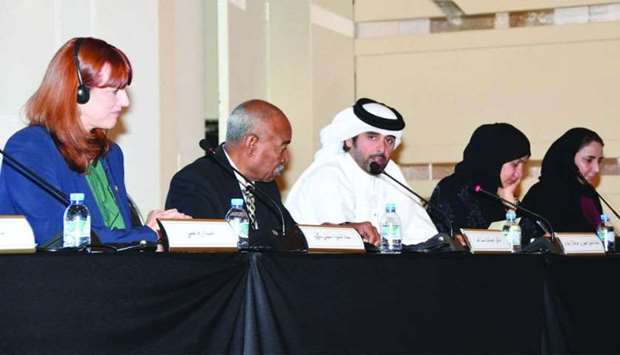HE the Director of the Human Rights Department at the Ministry of Foreign Affairs Ambassador Faisal bin Abdullah al-Henzab has reaffirmed Qatar's keenness on empowering women and providing support and an environment that would enhance their political, civil, social, economic and cultural rights, noting that this keenness was reflected in Qatar National Vision 2030 and in national development strategies 2011-2016 and 2018-2022.
This came in a speech by ambassador al-Henzab during the opening of a seminar entitled: 'Empowerment of Women in Humanitarian, Development and Peace,' organised by the Department of Human Rights at the Ministry of Foreign Affairs in co-operation with the Canadian embassy, as part of International Women's Day.
Ambassador al-Henzab pointed out that the national legislation issued in recent years reflected Qatar's increasing interest in promoting and protecting women's rights, eliminating discrimination between them and men, and establishing the rules of equality between both in various fields.
He referred to Amiri Decree No 22 of 2017, which saw four women join the Advisory Council and doubled the number of Qatari women joining the judiciary, the public prosecution and the diplomatic corps.
Qatar had affirmed its full commitment to implement its obligations under the United Nations' Convention on the Elimination of All Forms of Discrimination Against Women and to co-operate fully with the Committee and other international and regional mechanisms, the ambassador added.
He highlighted the country's launch of several initiatives at the regional and international levels, such as Silatech, which since its establishment in 2008 has contributed to the employment of about 1,000,000 young men and women and aims to provide 2,000,000 jobs by 2020 within the Arab world.
He also pointed to Education Above All, a global initiative that includes four international programs, Educate A Child, Al Fakhoora, Protecting Education in Insecurity and Conflict (PEIC) and Reach Out to Asia (ROTA), which contribute to children's access to education.
Ambassador al-Henzab noted Qatar's support of the Charlevoix Declaration on the provision of quality education for girls and pledged to provide education for 1,000,000 girls by 2021 during His Highness the Amir Sheikh Tamim bin Hamad al-Thani's participation in the Leaders Dialogue round table entitled: Charlevoix Declaration on Quality Education for Girls, Adolescent Girls and Women in Developing Countries, at the invitation of the Prime Minister of Canada Justin Trudeau, on the sidelines of the United Nations General Assembly during its 73rd session.
The ambassador underlined Qatar's committed role in promoting and protecting women's rights and empowerment at the regional and international level.
The country provided financial support to many international initiatives, including $90,000 to support main resources to the United Nations Entity for Gender Equality and the Empowerment of Women, USD 100,000 for the study on women, peace and security, as well as the publication of the book 'Story: Celebration of Leading Women in the United Nations,' which documents the contributions of the UN's leading women in strengthening peace and security efforts.
He stressed that Qatar will spare no effort to continue its efforts to empower women at all national, regional and international levels.
Ambassador of Canada to Qatar, Stefanie McCollum, praised the organisation of the seminar which was moderated by the Director of the United Nations Centre for Human Rights Training and Documentation for Southwest Asia and the Arab Region Dr Abdulsalam Sayed Ahmed, and was attended by a number of ambassadors accredited to the State and members of the diplomatic corps.
The seminar was also moderated by Director General of the Qatar Red Crescent Relief and Development Sector Noura al-Dosari, Secretary General of the Qatar National Committee for Education, Culture and Science Dr Hamda Hassan al-Sulaiti, Chairperson of Qatar Women's Sports Committee Lulwa al-Marri, and Family Affairs Department, Ministry of Administrative Development, Social Reem Alajmi.

